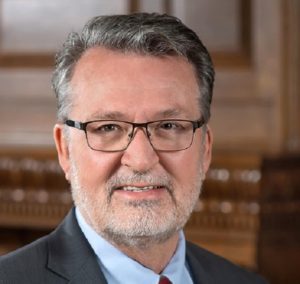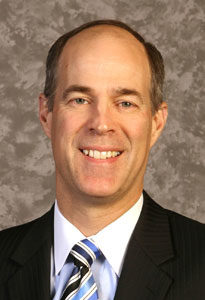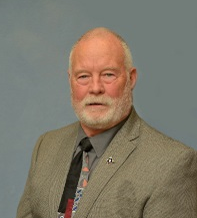It’s an issue that’s been brewing just underneath the surface of Kansas politics this year.
There’s been some fleeting mention of large wealth managers who take their cues from environmental, social responsibility and corporate governance guidelines — otherwise known as ESG — in deciding where they want to put their money.
There’s been a brief hearing on it in the Legislature, some scant mention of it in the race for Kansas treasurer and just last week, Republican Attorney General Derek Schmidt joined a national investigation of major banks over ESG investing practices.
It’s a debate that’s caught fire across the nation, especially from Republican lawmakers who fear that state money managers are using their political preferences to guide where their investments are made, away from fossil fuels and into green energy.
Critics call it “woke capitalism” forced on companies by shareholder activists, asset managers, politicians and federal regulators.
Former Vice President Mike Pence, who was in Kansas last week to campaign for Schmidt in his race for governor, called ESG a “pernicious strategy.”
He said it allows the left to accomplish for the environment what it can’t achieve at the ballot box.
Others argue that a group of Republican state treasurers are surreptitiously trying to undermine federal and state efforts to protect the environment by taking action against companies that want to reduce greenhouse emissions with ESG investing.
ESG has emerged as of the most significant developments in corporate management and high finance in recent years, although its definition is murky and can depend on the eye of the beholder if not their political outlook.
“Few observers know where the term comes from, who coined it, and what it was originally aimed to mean and achieve,” wrote Elizabeth Pollman, an expert in business law and co-director of the Institute for Law and Economics at the University of Pennsylvania.
“As trillions of dollars have flowed into ESG-labeled investment products, and companies
and regulators have grappled with ESG policies, a variety of usages of the term have
developed,” she wrote in a paper published last month.
The term, she wrote, can be the benign incorporation of environmental, social, and governance’ issues into an investment analysis.
Or, she wrote, it can drift into “notions of corporate social responsibility or preferences for what some have characterized as ‘woke capitalism.'”
Alan Conroy, executive director of the Kansas Public Employees Retirement System, agreed that ESG issue is fluid.
“It’s an evolving sort of issue,” Conroy told a legislative committee in March.
“Who’s doing it, who’s not or what’s the definition to make that decision. Are they in? Are they out,” he said.
Nevertheless, it’s an issue that’s starting to take hold in Kansas where investment giant BlackRock – a target of ESG critics – passively manages $2.6 billion in a Russell 3000 index account, or roughly 11% of the total state pension fund’s investment portfolio.

Democratic state Treasurer Lynn Rogers, who is running for a full four-year term, has staked out a position on ESG, which lawmakers tried addressing last legislative session.
If elected, Rogers – a banker by trade – would continue serving on the board that oversees the state’s pension system and could influence how its assets are managed.
“Investment decisions must be based on as much information as possible about the risks that companies are facing,” Rogers said.
“That’s to me what really ESG is,” he said in an interview earlier this year.
“It gives investors information on what that company is doing in regards to the environment in terms of the social contract they have with the public,” he said.
“It’s really information that an investor can use to make a smart investment.”
Rogers said ESG has become to business what critical race theory – or CRT- became to public education.
“People are making it into a political boogeyman,” Rogers said.
As a member of the pension system’s board, Rogers said he’s never made a decision based a political agenda.
“We’re weighing our risks of what we can get for our best return and what’s the best return for the state of Kansas,” he said.
Rogers’ Republican rival for treasurer – Republican state Rep. Steven Johnson of Assaria — held a hearing on the issue during the last legislative session in the spring.
He opposes using ESG as a guide for making investment decisions.
“What I am for is just the highest and best return,” Johnson said.
“I can’t add return by adding constraints. The fiduciary responsibility is asking the question, ‘Where is the highest and best return?'”
Johnson takes issue with comments made by the head of BlackRock earlier this year that indicated ESG investing should be a priority.
“I don’t agree that is in the best interest of return,” he said.

Johnson said his opposition to using ESG to screen investments isn’t related to green energy.
“I am all for investing in green energy,” Johnson said. “If it has the highest and best return, you should invest there.
“I would also say if there’s a place for oil and gas – or nuclear is allowed – any of those other forms is deserved of capital as well,” he said.
Johnson has suggested that the state needs to watch how BlackRock is voting the state’s proxy shares of stock to ensure that it’s not trying to influence how businesses are run against the interests of the state.
Johnson said he wants better reporting how those shares are voted.
The issue has surfaced in other ways in Kansas.
There was a bill introduced last session aimed at restricting so-called ESG investing by banning banks, credit unions and other businesses from engaging in “unfair” and “discriminatory” practices.
The bill went nowhere. The issue is expected to return in 2023.

During her primary campaign for treasurer, Republican state Sen. Caryn Tyson and 10 other state lawmakers urged the Securities and Exchange Commission not to adopt a rule requiring public companies to provide climate-related financial data and greenhouse gas emissions insights in public disclosure filings.
“The vast majority of those who support the SEC’s proposed rule based on a political agenda are foreign based asset managers,” Tyson said at the time the letter was sent.
“As an elected official who represents the interests of Kansans, I cannot stand by and do nothing when anti-American foreign activists have more say with proposed rule changes that directly impact hardworking Americans,” she said.
While the SEC is still reviewing public comment and hasn’t settled on a final rule, research by the Governance & Accountability Institute, Inc. – a consulting firm on corporate sustainability and ESG – said most companies are already reporting.
The group reports 92% of Standard & Poor’s 500 companies already publish ESG reports and many other companies worldwide are reporting on greenhouse gas emissions in response to investor pressure.
But just last week, Schmidt, a candidate for governor, joined with Missouri and 17 other state attorneys general in launching an investigation into six major national banks over the issue of ESG investing.
Missouri Attorney General Eric Schmitt announced the investigation of Bank of America, Citigroup, Goldman Sachs, JP Morgan Chase, Morgan Stanley and Wells Fargo.
The attorneys general want to know about the banks’ involvement with the United Nations’ Net-Zero Banking Alliance, which brings together a global group of banks committed to aligning their lending and investment portfolios with net-zero emissions by 2050.
“This is part of our ongoing effort to hold accountable those firms with a fiduciary duty to seek returns for investors – including the state of Kansas, which holds a large investment portfolio through KPERS,” said John Milburn, spokesman for the attorney general’s office.
But Schmidt’s campaign manager, C.J. Grover, did not respond to an email seeking to find out if the attorney general favored any kind of new state restrictions on ESG investing if he’s elected governor.
Schmidt’s decision to sign up with the banking investigation came after he joined a group of attorneys general in August asking asking the chief executive of BlackRock to clarify whether it was using investor money to advance its political agenda related to energy policy.
The company has since pushed back, saying it does not boycott energy companies or any other sector or industry.

In his annual letter to company CEOs earlier this year, BlackRock’s chairman, Larry Fink, signaled that ESG investing was a priority.
“Stakeholder capitalism is all about delivering long-term, durable returns for shareholders. And transparency around your company’s planning for a net zero world is an important element of that,” Fink wrote.
“As stewards of our clients’ capital, we ask businesses to demonstrate how they’re going to deliver on their responsibility to shareholders, including through sound environmental, social, and governance practices and policies.”
The investment firm, he said, focuses “on sustainability not because we’re environmentalists, but because we are capitalists and fiduciaries to our clients.
“That requires understanding how companies are adjusting their businesses for the massive changes the economy is undergoing.”
Johnson, who also has a career in financial services, took issue with those comments.
He said he thought it was an effort to implement left-leaning environmental policies through the investment policy of the money managers.
“While they are not divesting from oil and gas, they are asking companies to set short, medium and long-term targets for greenhouse gas reductions,” Johnson said during the legislative hearing in March.
“I both want to have a balanced strategy of investing in industries, particularly in energy,” Johnson said. “I’m particularly interested in that for Kansas and our energy industry.”
Fink’s comments rattled some Republican attorneys general who wanted more clarity about how state assets will be invested.
“BlackRock’s past public commitments indicate that it has used citizens’ assets to pressure companies to comply with international agreements…that force the phase-out of fossil fuels, increase energy prices, drive inflation, and weaken the national security of the United States,” said the letter Schmidt signed onto in August.
“Our states will not idly stand for our pensioners’ retirements to be sacrificed for BlackRock’s climate agenda,” they wrote.
“The time has come for BlackRock to come clean on whether it actually values our states’ most valuable stakeholders, our current and future retirees, or risk losses even more significant than those caused by BlackRock’s quixotic climate agenda.”
BlackRock offered its response in a 10-page letter to all of the attorneys general who signed onto the August letter.
“We believe America’s retirees deserve access to the full range of investment options that help them meet their retirement goals, and we are troubled by recent efforts to use “anti-boycott” statutes to limit retirees’ options in meeting those goals,” wrote Dalia Blass, senior managing director for BlackRock.
“BlackRock does not boycott energy companies or any other sector or industry.”
The company said it was among the largest investors in public energy companies with about $170 billion invested in U.S. firms.
“When BlackRock does decide to oppose a position supported by the company’s management, we are driven by a business purpose; that is, to prudently manage investments for our clients,” Blass said.
Already, there are states moving to punish money managers that apply ESG guidelines in assessing their investments, which last month prompted criticism from a group of 13 Democratic state treasurers.
“These blacklists are a backlash response on behalf of political and corporate interests seeking to interfere with the progress made by those of us who believe in collaboration and engagement,” said the letter from the treasurers not counting Rogers.
“The blacklisting states apparently believe, despite ample evidence and scientific consensus to the contrary, that poor working conditions, unfair compensation, discrimination and harassment, and even poor governance practices do not represent material threats to the companies in which they invest.
“They refuse to acknowledge, in the face of sweltering heat, floods, tornadoes, snowstorms and other extreme weather, that climate change is real and is a true business threat to all of us,” the letter said.
Consider what’s happened so far:
- Last summer, West Virginia State Treasurer Riley Moore announced that five financial institutions were no longer eligible for state banking contracts after determining they were boycotting fossil fuel companies. The ban applied to BlackRock Inc., Goldman Sachs Group Inc., JPMorgan Chase & Co., Morgan Stanley and Wells Fargo & Co. Moore had pushed for a law that allowed the state to disqualify financial institutions that were found to be boycotting energy companies.
- In Texas, Comptroller Glenn Hegar accused 10 financial companies, including BlackRock and 350 investment funds, of taking steps to “boycott energy companies.” They were banned from doing business with the state. The announcement was an attempt to call out companies that, in the comptroller’s view, were undercutting the state’s energy industry. The company took issue with that characterization in a letter responding to charges that it boycotted energy companies.
- In Utah, Republican Gov. Spencer Cox, state Treasurer Marlo Oaks and the state’s congressional delegation sent a letter to bond ratings agency S&P Global Ratings to demand that it withdraw ESG indicators for states and local governments. “ESG is about controlling and forcing behaviors. It attempts to do through capital markets what activists and their government allies have been unable to do through democratic processes,” Oaks said in a statement.
- In Florida, a state board chaired by Gov. Ron DeSantis, who visited Kansas to campaign for Schmidt, passed a resolution directing the state’s money managers to invest state funds in a manner that “prioritizes the highest return on investment for Florida’s taxpayers and retirees without considering the ideological agenda of the environmental, social, and corporate governance movement.”
The issue going into 2023 is how will Kansas address the issue.
Last session, a group of more than two dozen lawmakers introduced a bill aimed at ESG investing by banning banks, credit unions and any other business from engaging in “unfair” and “discriminatory” practices.
The bill would have assessed a civil penalty of $50,000 for a first violation and $250,000 for a second or subsequent violation.
The bill died in committee after concerns were raised about whether it would make financial institutions vulnerable to lawsuits and whether it would potentially put them at odds with federal regulators pursuing ESG policies.
“The bill would have created an inadvertent cause of action against Kansas businesses, including banks, and would have created a liability for not doing business with certain industries regardless of creditworthiness or knowledge of the industry,” said Alex Orel, senior vice president of the Kansas Bankers Association.
“At the same time, there is a push from certain federal regulatory agencies to push an ESG agenda without legislative authority, and enactment of bills like this would put Kansas businesses, including banks in the crossfires of Kansas law and federal regulators.”
Orel said the Bankers Association would “strongly discourage” any attempts by government or the private sector to impose restrictions or mandates on an individual business’s ability to serve its lawful needs.
The bill’s lead sponsor, Republican state Rep. Michael Murphy of Sylvia, said the legislation is about protecting businesses from outside interests that use their money to influence business behavior.
“With two of our biggest industries in Kansas being agriculture and oil and gas, those are big targets with this bunch,” he said.

“What we’re trying to do is protect people so there’s still an equal playing field.”
Murphy said there is an effort underway to refine that legislation so that the state couldn’t require using ESG for investing criteria and ensuring that the state’s money managers don’t vote proxy shares in ways that runs counter to the state’s economic interests.
Murphy said the new bill will generally have the same approach although he expects the penalty provisions to be scaled back.
“We’re trying to make it a little more palatable,” he said.
Earlier this year, Conroy of KPERS cautioned that there could be transaction costs
associated with divestment and limiting the financial companies where money can be invested.
The combined transaction costs for the system’s public equity portfolio alone related to divestment of “listed financial companies” are estimated at $47.7 million to $81.7 million per year, Conroy told lawmakers.
Rogers issued a statement Friday, saying that politics should not interfere with state financial matters.
He said ESG data is “objectively observable information” about real financial risks that aren’t captured in financial statements.
“This information is a tool that can help investors make better decisions,” he said.
“Our investment professionals should have access to ESG data and every other tool they need,” Rogers said.
“Politicians should stay out of the way – especially here in Kansas.”
Johnson expressed concern about whether legislation is the answer to the question about ESG investing.
“The challenge with legislative solutions is the ball moves,” Johnson said. “Sometimes you’re trying to hit a fly with a hammer.
“You want to be careful of what collateral damage happens when I swing that and the target has moved,” he said.
“I would support legislative action, I just want to make sure we look through what collateral damage there could be long term.”













